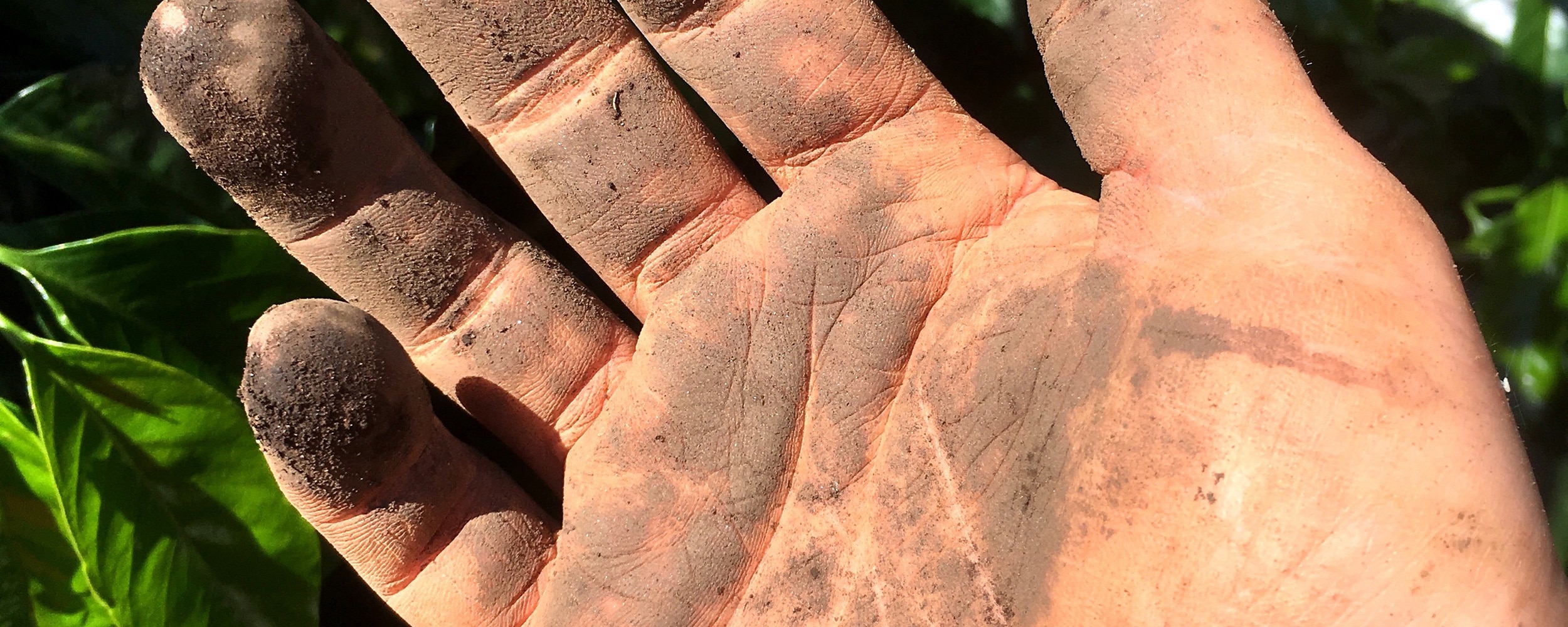Blueprint’s engagement with soil health and soil microbiology is the beginning of an effort to build long-term partnerships with origin partners based on the principles stated in our green buying vision. Organic farming is also a passion of mine, which grew out of a three-year process of building and managing a 25-bed communal neighborhood garden. The challenge of organic farming is in assessment and prescription of disease and pests. This challenge is also the draw of conventional farming. With this approach, when there is nutrition deficiency, simply add fertilizer, and if there is pathogenic fugal growth, add fungicide. This conventional approach ignores the importance of soil health, ecology, and its interplay with the plant.
Coffee farming is a volatile and unpredictable profession. As such, coffee farmers must tolerate a lot of risk. Much of that risk comes from pest, disease, and weather conditions that affect yield and quality, not to mention market volatility, which is another obstacle in itself. The best defense against these issues is and will always be an approach that considers long-term soil and plant health. I was able to advance my passion and knowledge for organic farming in 2015 when I took the Life in the Soil training developed by Dr. Elaine Ingham of Soil Food Web Inc. The training helped me understand and address fundamental issues of soil health and ecology.
This knowledge prepared me to engage with a few of our origin partners and establish test lots to observe the importance of soil health and the role of soil microbiology in coffee agriculture.
Only in recent history have we industrialized and tried to control plant health and soil nutrition with chemical products. Agricultural companies have ignored the relevance of nutrient cycling in making available the necessary nutrients for plants. Nutrient cycling describes the process of organic material breakdown and nutrient release by bacteria, fungi, protozoa and nematodes that allow a plant to acquire nutrients without fertilizers. Bacteria and fungi consume organic material and organisms higher in the food chain like protozoa, nematodes, and micro-arthropods eat them and release plant-available nutrients into the soil and root-zone. The presence and diversity of microorganisms that work with a certain plant is determined by its native habitat. The microbial composition of the agricultural soil should look and have a similar biological composition of its native soil. This is where, among many variables, compost comes into play. Compost is the primary tool organic farmers have in the “organic farming toolbox” to address plant and soil health issues. With an understanding of the native ecosystem we can build a compost recipe that supports the growth of beneficial organisms and a diverse soil
ecology.
Compost is a highly misunderstood component of organic farming and is frequently equated with piling a bunch of random materials in a pile and letting it rot. This misunderstanding of compost promotes pathogens, acids, and alcohols that are lethal to plant and soil health. Good quality compost is a process of selecting ingredients, preparing those ingredients, and managing the ingredients with temperature and moisture to kill pathogens and promote beneficial organisms. This is similar to good human nutrition, if ingredients are consciously selected and prepared well it promotes good personal health and well-being. These are the principles Blueprint is brining to origin partner farms in Central and South America.
After compost training, we apply the biology promoted in the compost via Actively Aerated Compost Tea (AACT). AACT amplifies the beneficial organisms produced in properly managed compost and creates a concentrate that can be diluted and sprayed as a foliar spray or soil soak. The AACT delivers the organisms needed to support and grow microbiology needed to support soil and plant health, provided the requisite organic material is present. Good compost provides necessary organic material and beneficial organisms to the soil. Organic material can be supported through multiple methods in addition to compost that can be easier to transport and manage.
Ideally, leaf litter from a well managed canopy or green manure/cover crops can provide organic material to support biology. AACT ends up being the vehicle to introduce the biology to support soil and plant health using similar methods (a backpack sprayer) used to apply fertilizers, pesticides, herbicides and fungicides, so labor does not not change significantly.
Coffee Farming, along with most of the world’s agriculture, has entered into a downward spiral of soil degradation, creating conditions that stress the plant and soil ecology, leading agricultural businesses to develop and sell products instead of addressing the root causes. Coffee Leaf Rust, for instance, is the result of decades of practices that killed beneficial microbiology along with pathogens, while creating conditions that actually promoted the spread of Coffee Leaf Rust. Copper sprays and misuse of other fungicides killed detrimental fungi, but along with it beneficial fungi and other organisms that could have competed with the Coffee Leaf Rust creating conditions to promote pathogen dominance, not beneficial organisms. When these practices destroyed the biology, they also destroyed soil structure. Soil structure is what manages rain water and oxygen in the soil. Soils with poor structure lose more nutrients from run off than they are able to acquire. Here is an example to illustrate the corrosive and cyclical effects of a conventional approach. Fertilizers destroy soil structure; the fertilizers need water to dissolve into the
soil and plant roots; the soil breaks down and gets compacted not allowing fertilizers to get to the roots; farmers then proceed to add more fertilizers to get the desired effect. And this repeats year after year until soil structure is restored. Despite the obvious reasons for farmers to move away from these practices, the risk is too great to make the transition with out support or training.
We have partnered with two farms and two mills to teach sound compost production principles and to introduce the use of Actively Aerated Compost Tea as an alternative to anaerobic compost tea practices. The scope of our training is focused on farms that are actively using compost in their system and want to improve their practices. When working directly with a farm, Blueprint commits to a test section. We agree to purchase their coffee regardless of quality in the section where they agree to collaborate with us to run the trial. In return for this commitment, we request to participate in the post-harvest processing introducing sound principles and practices. This partnership helps build trust and accountability for both parties and builds valuable knowledge. The farmer gets trained in sound compost principles and AACT application and receives a commitment to sell the coffee at real costs of production. Blueprint gets a long-term partnership with a farm and the assurance that the farm is healthy.
This is an unconventional approach to a huge challenge that goes beyond addressing soil health. Blueprint’s participation is wrapped in our passion to establish mutually beneficial relationships with all our partners in the coffee chain and to find ways to support innovation at the farm level.

